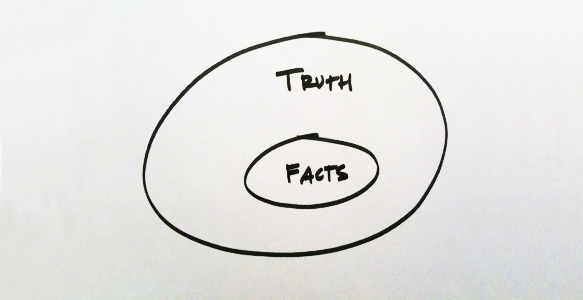The Facts of Truth
One of the first things I tell my New Testament students is that, while I can't prove God exists, I can prove the accuracy of the biblical record that claims he does. The kids are usually pretty interested by both statements, and we had some really good discussions last week on topics like general and specific revelation, inspiration and infallibility/inerrancy, and the character, motives, and lives of the eyewitness authors.
This week, I hope to talk with them about the document transmission/textual criticism of the Scriptures, and the corroborating evidence from non-biblical ancient writers and modern archaeology. It will be a lot to cover, but it's key to understanding why I can ask them to have faith in their Bibles without checking their brains at the door.
At the end of last week, I asked the students to write out questions they had about the Scriptures, particularly with regard to its formation and background. Here, in no particular order (and some more informed than others), are just a third of the questions they turned in:
Why are there many translations of the Bible?
How did the Bible come to mass circulation and be so well known in the world?
Why is the Bible called the Bible and what does that mean?
How many people wrote the Bible?
How did the books get placed in order?
What was the original language the Bible was written in?
What are differences between the Bible and other holy books?
How did the authors of the books of the Bible know what to write in the Bible?
How did the authors transform the Bible from a scroll to what we have now?
Who started making different versions of the Bible?
What version do you think it was after it was written?
How did the people write the Bible? Did they think of it then write it or what?
Did the authors of the Bible know people in the future would be reading it?
Why did Matthew, Mark, Luke, and John write the exact same story four times instead of just joining them together?
Is the Bible true?
What was the first book of the Bible and when was it written?
Where were the Dead Sea Scrolls found?
When was the Bible first mass-produced?
Why was the Bible originally limited to one copy per church?
Was there a copy of the Bible in Bible times?
Which is more produced: the Bible or the Koran?
How did they get all of the books of the Bible together?
How did we get the Bible when it was written so long ago?
Why did they split up the Old and New Testament? Why not just make it one big testament?
Why did they not just call the chapters “one, two, three, four, etc.”?
What did the people write the Bible on?
How old are the oldest manuscripts that we have of the Bible?
How did the Apostles know that they were Apostles?
Is the Bible 100% true?
Where did the stories of the Bible take place?
Why doesn’t the Bible mention Jesus’ childhood?
Why aren’t there more books in the Old Testament if it was written 4,000 years ago?
What books didn’t make the Bible, and if there are other books, where are they?
What is the timeline of the people who wrote the Bible?
When was the Bible first translated into English?
Where do you see Bible history cross over with regular history?
How many Bibles have been sold?
Why was the Bible discontinued?
Where was the Bible discovered and who discovered it?
How and where is the proof that the Bible is accurate?
What do the epistles have to do with us?
Why aren’t the extra books added to the Bible talked about in class?
Why don’t some of the books relate to the other books?
Is it true that people used the Bible to make predictions?
Who decided what certain stories would be in the Bible?
How do we know that a group of people didn’t write the Bible a few hundred years ago and say it was older?
When was the first book of the Bible written? The last book?
Are the books of the Apocrypha true? How come Catholics have them in their Bibles?
What happened between the “silent years” between the Old and New Testaments?
Who wrote some of the books with unknown authors?
What is your favorite book of the Bible?
A good list, which should keep me busy for a while.




